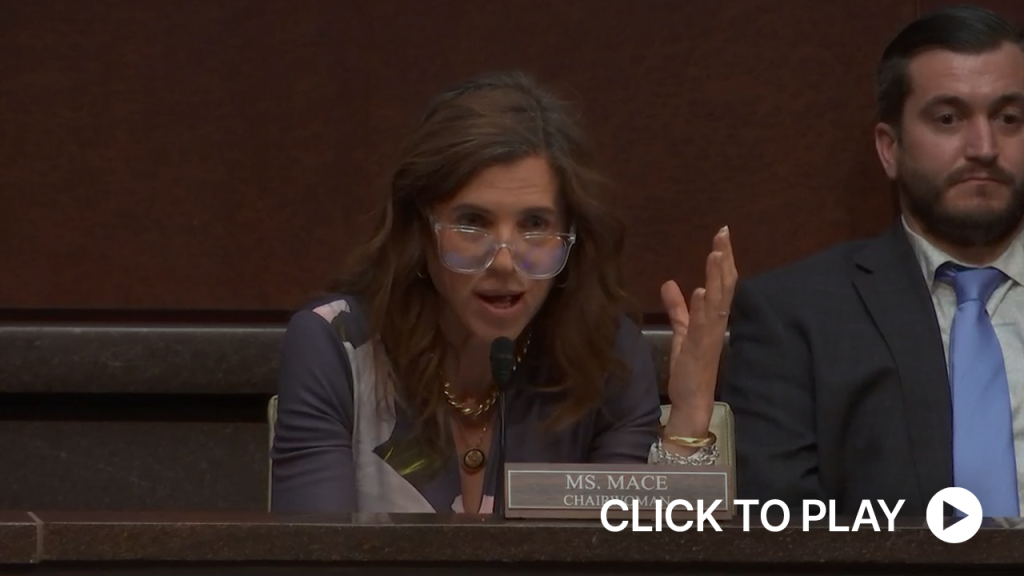Wrap Up: Congress Must Ensure the Federal Government Has Tools to Deploy Artificial Intelligence Effectively and Efficiently
WASHINGTON—Yesterday, the House Committee on Oversight and Government Reform held a hearing titled “The Federal Government in the Age of Artificial Intelligence.” During the hearing, expert witnesses stressed the urgent need for the federal government to adopt artificial intelligence (AI) responsibly to enhance efficiency, improve public services, and reduce costs for taxpayers. In support of President Trump’s commitment to maintaining U.S. dominance in AI, members underscored the House Oversight Committee’s ongoing efforts to eliminate unnecessary obstacles and accelerate responsible AI innovation. Members concluded that the Biden Administration’s regulation-first approach to AI stifled technological progress and emphasized that the entire federal government needs the tools and authorities now to deploy AI effectively.
Key Takeaways:
The responsible development of AI is crucial to maintaining economic competitiveness, fostering innovation, saving taxpayer dollars, and ensuring a federal government that operates efficiently and effectively.
Cybersecurity, Information Technology, and Government Innovation Subcommittee Chairwoman Nancy Mace (R-S.C.) stated during her opening: “AI is no longer some futuristic idea—it’s here, and it’s already reshaping everything from healthcare and national defense to finance and fraud prevention. The federal government has a responsibility to harness this technology to make government work faster and more efficiently for the American people. The Department of Defense is using AI to improve decision-making and protect our men and women in uniform. Federal agencies are using AI to detect fraud before it happens—by using the technology to identify patterns of fraudulent behavior and working proactively to prevent improper payments. AI agents are beginning to help with administrative tasks, freeing up federal employees to focus on their mission instead of paperwork.”
Mr. Bhavin Shah, Founder and Chief Executive Officer, Moveworks, testified: “AI is fundamentally transforming how work gets done across America’s $30 trillion economy. AI solves a universal problem for public and private entities by transforming employee experience, providing instant support, reducing the toil of manual and tedious tasks, and allowing employees to focus on activities and jobs that provide significantly more value to the organization, leading to more efficient and effective organizations. By failing to quickly adopt AI, the government is losing out on the benefits.”
Ms. Linda Miller, Founder and Chief Growth Officer, TrackLight, stated: “AI is a game changer in streamlining government service delivery and preventing fraud, waste, and abuse. AI systems trained by subject matter experts can detect patterns, relationships, and anomalies that humans alone would miss.”
Congress has an opportunity to support the Trump Administration’s bold initiatives to advance next-generation AI capabilities and help ensure the United States remains a global leader in AI technology.
Mr. Yll Bajraktari, President, Special Competitive Studies Project, testified: “We stand at the dawn of an intelligent age, a transformative period rivaling the industrial and nuclear eras, where AI—the new electricity, the engine of global change—is redrawing the very architecture of global power. It is clear that the nation that masters and fully adopts this foundational technology will not only lead but also write the rules for this new epoch.”
The House Oversight Committee will continue to consider legislation aimed at addressing the barriers and challenges preventing the federal government from fully realizing the benefits of AI.
Mr. Adam Thierer, Senior Research Fellow, R Street Institute, testified: “The federal government is already beginning to integrate AI into systems and processes. Progress is still slow, however, and there needs to be more urgency to tap the many benefits that AI can offer. Accenture estimates that by tapping AI systems, federal agencies ‘could unleash a productivity windfall for the U.S. government, worth up to $532 billion annually by 2028.’ Congress should recognize there is an important connection between broader AI policy and the benefits the government can gain from AI systems.”
Member Highlights:
Subcommittee on Cybersecurity, Information Technology, and Government Innovation Chairwoman Nancy Mace (R-S.C.) highlighted the federal government’s significant challenges in adopting AI technology, noting that hardworking taxpayers continue to bear the cost of outdated IT systems.
Rep. Mace: “The Government Accountability Office says that the federal government blows 80% of a $100 billion IT budget just keeping a 1970 IT system on life support. The IRS individual master file is written in COBOL code in the 60s and it still drives every tax refund today. I can’t even wrap my brain around that. I mean if I saw a line of COBOL right now I’d probably throw up to know one of the most important agencies for American taxpayers that you get your money back from was written in COBOL from the 60s.”
Representative Paul Gosar (R-Ariz.) discussed how AI can be utilized to root out waste and fraud in Medicare, Medicaid, and other critical federal programs to protect taxpayer funds from being stolen.
Rep. Gosar: “Could we use AI to audit Medicaid and Medicare or other programs?”
Ms. Miller: “Yes. That is a very good use for AI. We can look at data quickly with AI that can identify patterns and any taxpayer funds that are being stolen.”
Representative Glenn Grothman (R-Wis.) also highlighted the importance of AI’s role in combatting waste, fraud, and abuse of taxpayer funds.
Rep. Grothman: “The government loses half a trillion dollars a year to fraud. That is an astonishing amount. Can AI help with this? What kind of productivity can we see from AI?”
Ms. Miller: “It is an astounding number. We need to invest in AI technology to prevent fraud.”
Mr. Thierer: “AI can also help with administrative tasks and make operations more efficient. There are important things for instance being done right now at the State Department and other agencies to utilize AI.”
Representative Virginia Foxx (R-N.C.) emphasized that the Trump Administration is working to maintain our dominance in the AI field and use the technology to streamline services provided by the federal government.
Rep. Foxx: “AI technology can be successful at streamlining tasks and boosting productivity. What kind of productivity gains and cost savings could we expect to see in the federal government?”
Mr. Shah: “To put it in maybe legislative terms, imagine you had an assistant that could summarize the status of a bill. Perhaps maybe look up a constituent problem that you’ve been tackling before a meeting. Or being able to search all of your notes and your memos about various committee hearings and tasks that have been assigned. All these are things that AI gives us today and the private sector is using this quite aggressively to make their own teams more efficient and effective. To your question, if we can do some of this more efficiently in the federal government these benefits go back to taxpayers and back into the economy.”
Representative Eric Burlison (R-Mo.) stressed that AI can transform federal government operations and pointed out how the private sector can be a great partner to unlock the technology’s full potential.
Rep. Burlison: “AI will transform how we operate. Ms. Miller, in your testimony you discuss why agencies should buy commercial technology rather than build custom code. As someone who was an in house custom coder, I couldn’t agree with you more. Could you follow up and elaborate on that?”Ms. Miller: “The point I was making in my testimony about that was that it creates technical debt when you’re creating your code yourself and because AI is moving so quickly it’ll be obsolete soon after it’s built and so it makes sense to contract with vendors in the private sector who have more updated tools. I would just add that this can be very beneficial to small innovative technology companies.”
Representative Byron Donalds (R-Fla.) discussed how energy and data center infrastructure in the United States is critical to maintaining our current and future edge in AI technology.
Rep. Donalds: “Florida has one of our largest data centers. Can you all share some ideas on how Congress and the Trump Administration can accelerate the safe deployment of clean advanced nuclear energy and AI data centers to support our growing energy and computing demands?”
Mr. Yll Bajraktari: “I think in the last couple of months we have seen a really clear linkage between advancing AI and AI models and reliance on new modes of energy. My organization really is focused on the development of fusion energy for example because I think one of the pathways that now is showing real great success in our country is the emergence of private sector companies that are showing incredible successful models of how to get to fusion energy. Fusion is one of the pathways that I think can enable the energy demand that we will face going forward when it comes to advancing AI models. But that’s not going to be enough alone. We should pursue multiple pathways because we want to be energy independent, and we want to have the best AI models available to the world.”
Representative Tim Burchett (R-Tenn.) emphasized that Congress must prioritize safeguarding Americans’ privacy while maintaining our dominance over the Chinese Communist Party in the AI field.
Rep. Burchett: “Congress must work to protect the privacy of Americans. But we need to maintain our edge. China is making advancements. How do we maintain our dominance in the AI sector?”
Mr. Thierer: “Well a lot of it comes down to making sure that America diffuses first. We are essentially winning one part of the AI war and losing another. We’re winning with partners developing really sophisticated high-powered frontier models and other systems and applications. But the reality is that China may be winning the energy diffusion side of things.”
Mr. Bajraktari: “We have to out innovate and out maneuver China. Our platform should be the dominant global platform. We have to work with our allies and partners to spread our platforms to the global south and rest of the world. Last we’ve got to find ways to slow down China and make it impossible for them to deploy their capabilities and to use their capabilities against us.”
Mr. Shaw: “We need to be a leader on the model side. We need to be the software and hardware that others use.”
Ms. Miller: “We need to protect our infrastructure. China is actively looking to infiltrate our systems. China is doing a very good job of figuring out how defeat our security vulnerabilities. We need to get better at protecting our systems.”
READ MORE:
Mace Opens Hearing Examining the Federal Government’s Use of Artificial Intelligence
Legal Disclaimer:
EIN Presswire provides this news content "as is" without warranty of any kind. We do not accept any responsibility or liability for the accuracy, content, images, videos, licenses, completeness, legality, or reliability of the information contained in this article. If you have any complaints or copyright issues related to this article, kindly contact the author above.






